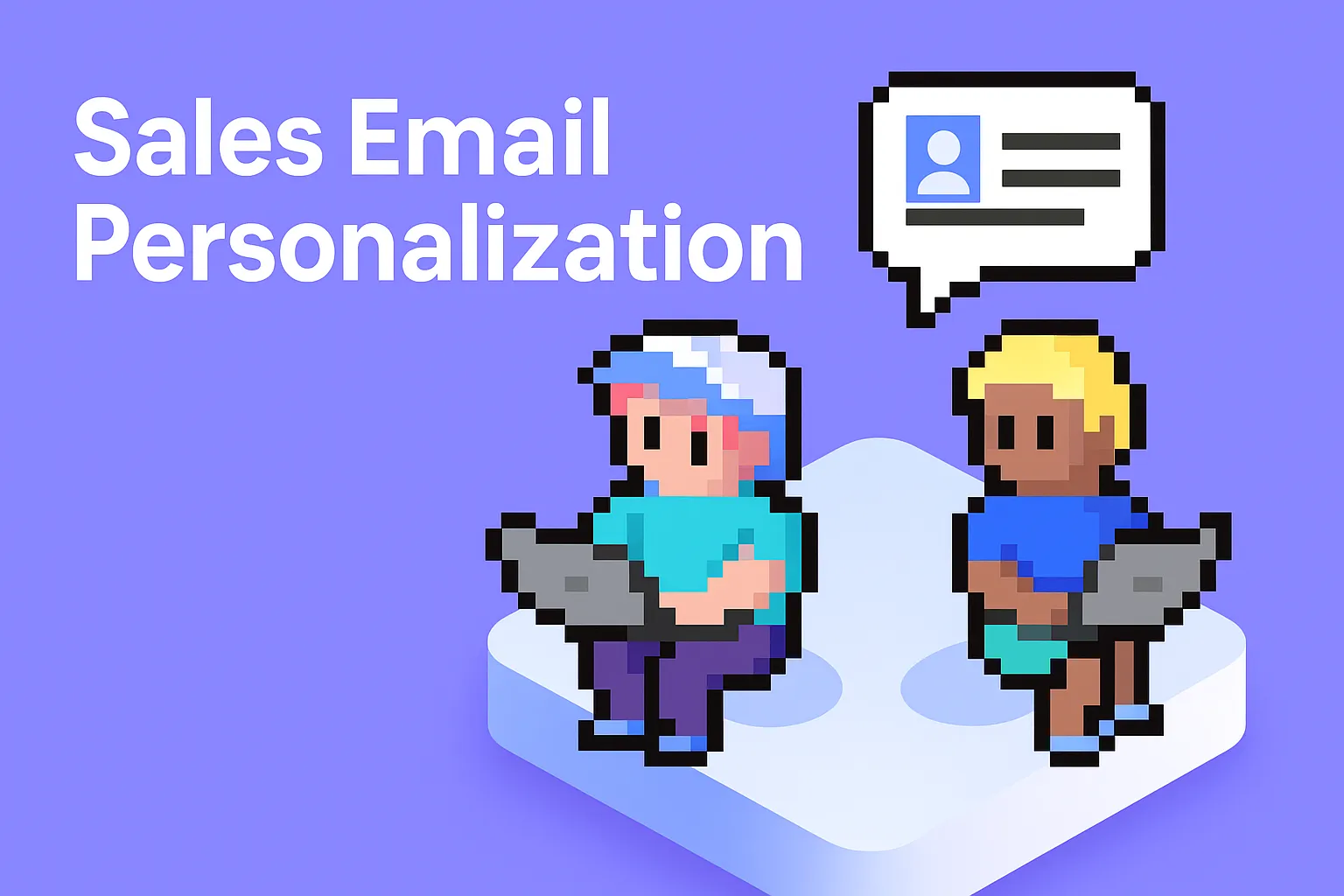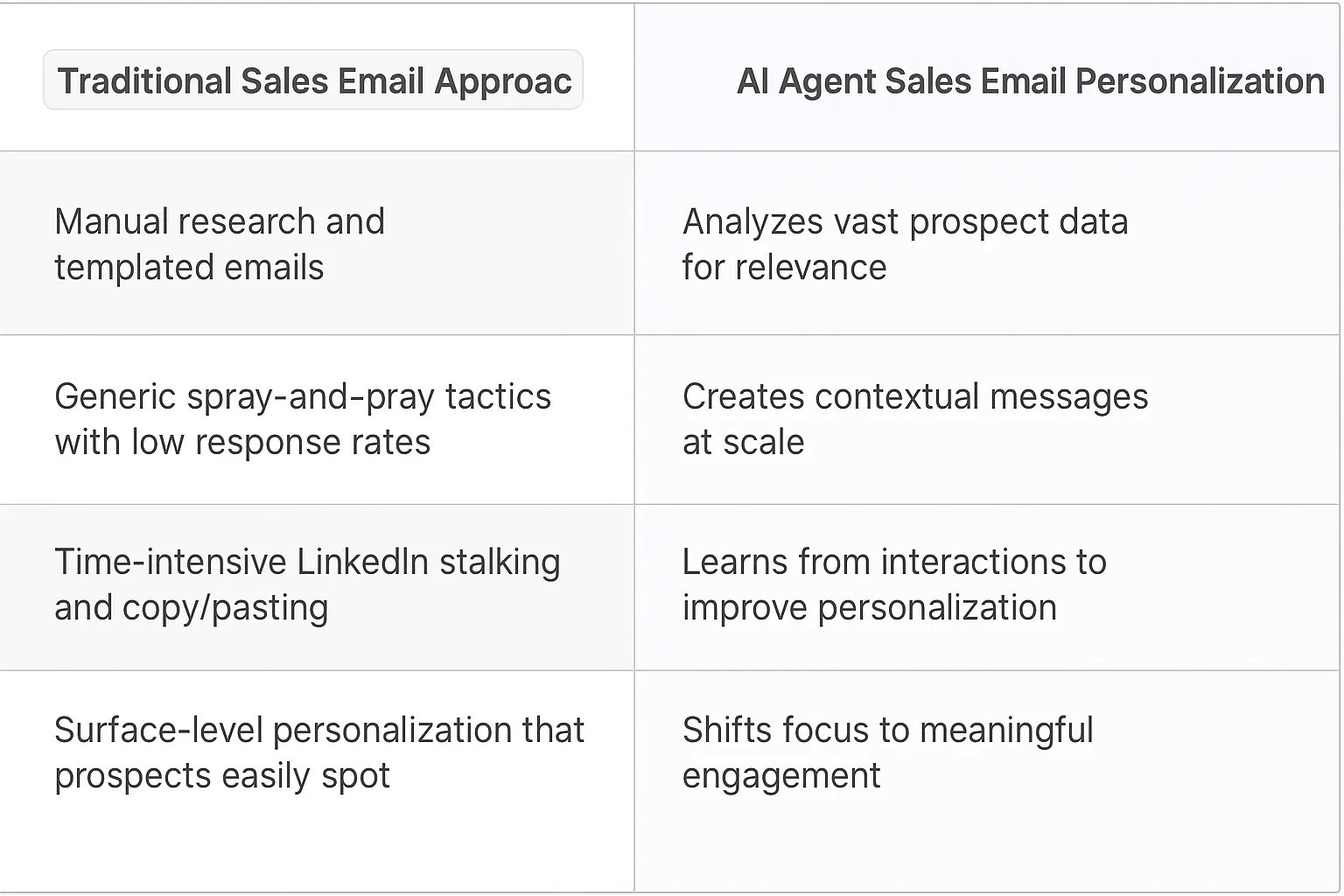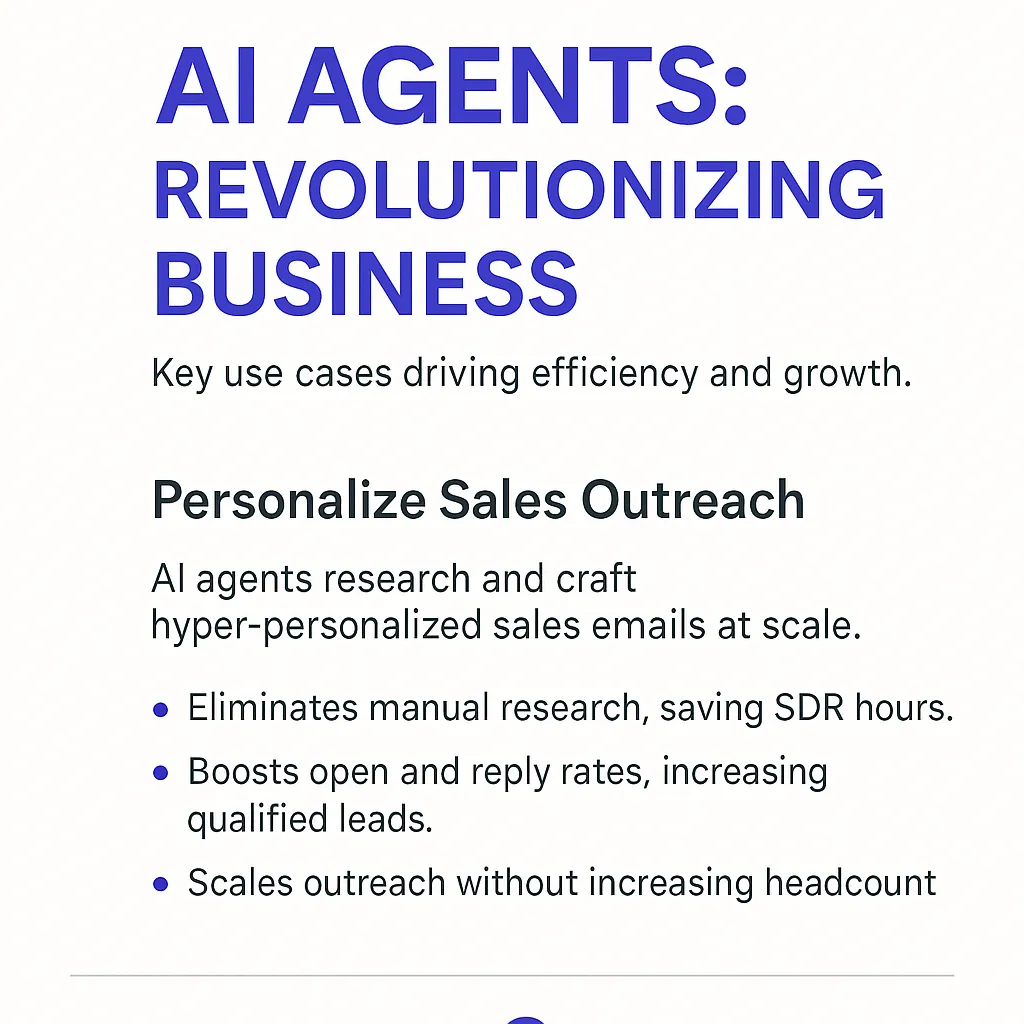Sales Email Personalization AI Agents
The Evolution of AI-Powered Sales Outreach
Sales email personalization powered by AI agents represents a sophisticated approach to prospect outreach. Unlike traditional templated emails, these digital teammates analyze multiple data points - from social media activity to company news to behavioral signals - creating deeply contextual messages that resonate with each recipient's specific situation and needs. The technology transforms raw data into meaningful conversations that feel natural and relevant.

Benefits of AI Agents for Sales Email Personalization
What would have been used before AI Agents?
Sales teams traditionally relied on manual research and templated emails - a brutal combination of LinkedIn stalking, company website scanning, and copying/pasting from previous emails. SDRs would spend hours trying to find personal details to reference, often settling for surface-level personalization that prospects could spot from a mile away. The reality was that most teams defaulted to spray-and-pray tactics, sending generic emails at scale and hoping something would stick.
What are the benefits of AI Agents?
The game-changing aspect of AI agents for sales email personalization is their ability to process vast amounts of prospect data in seconds and generate genuinely relevant outreach. These digital teammates can analyze a prospect's content trail - their social posts, company updates, recent news, and professional achievements - to craft messages that feel like they're coming from someone who's done their homework.
The network effects here are fascinating. Each successful interaction helps the AI agent better understand what resonates with specific buyer personas. They're learning machines that get sharper with every email sent, becoming increasingly adept at matching tone, style, and content to each prospect's preferences.
But the real power move is how AI agents handle the context switching that kills most sales reps' productivity. While human sellers get mentally drained jumping between different industries and personas, AI agents maintain consistent quality across hundreds of personalized touches. They're applying the same deep level of attention to the first and hundredth email of the day.
The cold email game is evolving from a numbers game to a relevance game. AI agents are shifting the focus from "how many emails can we send?" to "how meaningful can each interaction be?" - and that's where the real ROI kicks in. When your outreach feels like it's coming from someone who genuinely understands the prospect's world, response rates don't just increment - they multiply.

Potential Use Cases of Sales Email Personalization AI Agents
Processes
- Research-driven personalization that analyzes prospect companies' recent news, social media, and public data to craft highly relevant email hooks
- Dynamic content generation that adapts email copy based on prospect industry, role, and company size
- A/B testing optimization that continuously learns from email performance data to refine messaging approaches
- Multi-touch campaign orchestration that creates coherent narrative arcs across email sequences
- Intent signal monitoring that triggers perfectly-timed follow-ups based on prospect behavior
Tasks
- Transform generic templates into personalized messages by weaving in prospect-specific insights and pain points
- Generate custom subject lines that reference recent company milestones or industry trends
- Create tailored value propositions by mapping product benefits to each prospect's specific business context
- Write follow-up emails that thoughtfully build on previous interactions and responses
- Develop industry-specific social proof examples and case studies to include in outreach
- Craft personalized call-to-action suggestions based on prospect's role and likely priorities
- Generate meeting agenda proposals that align with prospect's known challenges
The Growth Loop Effect
The most fascinating aspect of AI-powered sales email personalization is how it creates compounding returns through what I call "the personalization feedback loop." Every interaction generates data that makes future personalization more precise and effective.
When sales teams deploy these digital teammates effectively, they're not just sending better emails - they're building an intelligence engine that gets smarter with every prospect interaction. The system learns which hooks resonate with different buyer personas, which pain points drive engagement, and which call-to-action styles convert best.
This creates a powerful growth loop: Better personalization leads to higher response rates, which generates more interaction data, which enables even better personalization. The teams that master this loop gain an increasingly unassailable advantage in their market.
The key is thinking of these AI agents not as mere email writing tools, but as relationship intelligence platforms that continuously learn how to make human connections more meaningful and effective at scale.

Industry Use Cases
Sales email personalization through AI agents represents one of the most impactful shifts in how businesses approach customer outreach. The data shows that personalized emails generate 6x higher transaction rates, but manually crafting individual messages simply doesn't scale. This is where AI agents create massive leverage.
The real power comes from AI agents' ability to analyze vast amounts of customer data points - from past interactions to social media activity to purchase history - and transform those insights into highly relevant, contextual outreach. Rather than basic mail merge fields, these digital teammates can identify specific pain points, reference relevant case studies, and adjust tone based on the recipient's communication style.
What makes this particularly fascinating is how it changes the fundamental economics of sales outreach. While a human sales rep might thoughtfully personalize 15-20 emails per day, AI agents can generate hundreds of genuinely individualized messages that feel human-crafted. This isn't about replacing sales teams - it's about giving them superpowers to focus on high-value relationship building while AI handles the heavy lifting of initial personalized outreach at scale.
The most successful implementations we're seeing combine AI's analytical capabilities with human oversight and refinement. The AI agent becomes a force multiplier for sales teams' expertise rather than operating as a black box.
Real Estate: Converting Cold Leads Through Hyper-Relevant Outreach
Real estate agents face a unique challenge - they need to reach dozens of potential sellers daily while making each interaction feel genuinely personal. The traditional "spray and pray" approach of sending identical templated emails yields dismal response rates, often below 2%.
A Sales Email Personalization AI Agent transforms this dynamic by analyzing property data, market conditions, and digital footprints to craft messages that resonate with individual property owners. The agent pulls insights from multiple data sources - recent sales in the neighborhood, property tax records, renovation permits, and even social media signals indicating potential life changes that often trigger real estate decisions.
For example, when reaching out to an owner of a 1960s ranch-style home in an up-and-coming neighborhood, the AI agent might reference:
- Recent sales of similar vintage homes nearby that sold above asking price
- The growing trend of young families renovating mid-century properties in the area
- Specific architectural features that make their home attractive to current buyers
The result? Response rates jumping to 15-20% because each email feels researched and relevant rather than mass-produced. One Denver-based realtor using this approach generated 47 seller leads in a month from cold outreach - a 6x improvement over their previous email campaigns.
The key insight is that AI doesn't just swap in names and addresses - it identifies and weaves together multiple contextual threads that make the outreach genuinely valuable to the recipient. This shifts the dynamic from interruption marketing to insight-driven conversation.
E-commerce: Turning Cart Abandoners into Loyal Customers
The math of e-commerce is brutal - 70% of shoppers abandon their carts, representing roughly $18 trillion in lost sales annually. Most recovery emails are painfully generic: "Hey, you left something behind!" But what if we could tap into the specific hesitations and motivations of each shopper?
Sales Email Personalization AI Agents are rewriting this narrative by crafting recovery emails that feel like they're coming from a personal shopping consultant who deeply understands the customer's journey. The agent analyzes multiple behavioral signals:
- Time spent viewing specific product features
- Price comparison patterns
- Previous purchase history
- Shopping cart composition
- Browsing patterns across product categories
When a luxury skincare brand implemented this approach, their AI agent created deeply contextual recovery emails. For a customer who spent time reading about ingredients and comparing similar products, the follow-up focused on formulation details and clinical results. For price-sensitive browsers, it highlighted the cost-per-use value proposition and included relevant bundle offers.
The numbers tell the story: The brand's cart recovery rate jumped from 8% to 31%. But the real magic wasn't just in recovering one-time sales - these personalized touchpoints built trust, leading to a 47% increase in customer lifetime value among recovered shoppers.
What's fascinating is how this shifts the fundamental dynamics of e-commerce follow-up. Instead of treating cart abandonment as a failure to convert, it becomes an opportunity to understand and address specific customer needs. The AI isn't just sending reminders - it's continuing the shopping conversation in a way that acknowledges and resolves individual hesitations.
Considerations & Challenges
Technical Challenges
Building effective sales email personalization requires navigating several complex technical hurdles. The first major challenge lies in data quality and integration. Sales teams often work with fragmented customer data spread across CRMs, marketing platforms, and internal databases. Getting AI agents to synthesize this scattered information into coherent, personalized messaging requires sophisticated ETL processes and robust data pipelines.
Natural language generation models need extensive training on industry-specific content to avoid generic-sounding outputs. Without proper fine-tuning, AI-generated emails can fall flat or miss crucial context about the prospect's industry, challenges, and buying signals.
Operational Challenges
Sales teams face a delicate balance between automation and maintaining authentic human connections. Over-automation can lead to prospects feeling like they're talking to robots rather than real salespeople. Sales leaders need to establish clear guidelines on when AI augments versus replaces human writing.
Training sales reps to effectively use AI tools presents another hurdle. Many experienced reps have developed their own personalization techniques over years. Getting them to adapt their workflow to incorporate AI requires demonstrating clear value and providing hands-on training.
Privacy and Compliance
Using AI for sales communication raises important privacy considerations. Sales teams must ensure their AI systems comply with data protection regulations like GDPR and CCPA. This includes implementing proper data handling procedures, getting necessary consent for automated communications, and maintaining transparency about AI usage.
Quality Control
Maintaining consistent quality across AI-generated content demands robust review processes. Sales teams need systems to catch potential errors, inappropriate personalization, or messaging that doesn't align with brand voice. This often requires human oversight and clear escalation paths when AI outputs don't meet standards.
Success metrics also need careful consideration - measuring the effectiveness of AI personalization requires looking beyond open rates to examine meaningful engagement metrics and actual sales outcomes.
AI-Powered Sales Evolution: The Future of Authentic Prospect Engagement
The evolution of sales email personalization through AI agents marks a pivotal shift in how businesses connect with prospects. The technology's ability to combine deep analysis with scalable execution creates a new paradigm for sales outreach. Forward-thinking teams that embrace these digital teammates gain compound advantages - not just in efficiency, but in building genuine relationships that drive revenue growth.
The most successful implementations treat AI agents as augmentation tools that enhance human capabilities rather than replacements. When sales teams master this balance, they unlock unprecedented ability to deliver personalized experiences at scale while maintaining authentic connections. The future belongs to organizations that can harness this technology to make every prospect interaction more meaningful and impactful.













